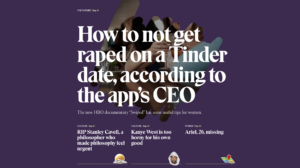Is brand differentiation enough to save publications?
This week saw credible rumours of the closure of the Glamour magazine brand in the US. For those that knew it (or had at least seen its marketing material) Glamour was the luxury lifestyle brand, perfectly pitched at people who needed expertly curated product recommendations and interviews with today’s most relevant celebrities. This, of course, was also the pitch for many of its contemporaries and, regardless of which title was your particular favourite, that led to issues surrounding differentiation in a shrinking marketplace. Its decision to transition from a print-led to a digital-only title is, in part, to escape that shrinking space, but the danger is that online lifestyle content is an even more crowded space.
Last week also saw the effective closure of The Outline. The Outline was a two-year old digital culture publisher that had a strong brand, a memorable visual identity and had seemingly been doing well, having raised $5.51 million in VC funding in May of this year, putting it
at a valuation of $21.15 million. At the time its founder Joshua Topolsky said that was in service of creating a “sane business that was scalable”, which was backed up by a very public strategy of not fruitlessly chasing scale like its contemporaries. Only a few months later, it was reported that The Outline had let its last full-time staff members go.
Both titles had everything going for them when it came to branding, though they’d both arrived at it from very different perspectives. So do their closures reaffirm the idea that ‘brand’ has lost its primacy when it comes to publications, as the difficulty in selling Time Inc’s flagship titles suggested earlier this year? Or were the two lacking other crucial differentiating factors that their competitors have maintained?
First off, it’s worth expanding on the point I made earlier: Both titles were in busy marketplaces. Glamour fell victim to the crunch in women’s lifestyle titles, which in turn led to an increasingly more competitive space, while The Outline’s focus on power, culture and the future put it in the path of some of the huge legacy titles who have historically focused on the same, though it did so from a different perspective.

Their positions within those markets undoubtedly led to their current statuses. Neither were the first to fall prey to market forces and they certainly won’t be the last. While Shane Smith might have compressed the timescale slightly when he foresaw a media “bloodbath”, the drawn-out culling of titles in busy verticals continues.
Nor did their respective mediums appear to have much of an impact on their business strategy. Glamour’s print closure puts it at odds with a number of print launches elsewhere – with Bauer UK launching a new niche title as recently as this week and confirming its Pilot TV magazine will get a second issue – while there are still high-profile digital pureplay publisher success stories.
Both had very different structures, one a legacy print title and one a shiny new digital operation, owned by someone who appeared to be avoiding the pitfalls of distributed publishing.
So what caused both titles to lose primacy in their niches, and ultimately force them to transition to strategies that arguably make their situations worse? Well, the proof is in the question – neither title really existed within a niche.
Both were generalist titles in one form or another. Glamour looked at women’s lifestyle, about the broadest topic you can cover, while The Outline, despite its unique perspective, was still covering ‘culture’, which isn’t a rarefied position. Meanwhile, the smaller, more niche brands are proving themselves to be viable for longer experiments and even potentially to be long-term subscription-based propositions.
Between that and the news about Time Inc.’s brands, it suggests that for all media companies talk about how prominent their brands are, brand differentiation isn’t enough – at least for generalist publications.
Martin Tripp Associates is a London-based executive search consultancy. While we are best-known for our work across the media, information, technology, communications and entertainment sectors, we have also worked with some of the world’s biggest brands on challenging senior positions. Feel free to contact us to discuss any of the issues raised in this blog.